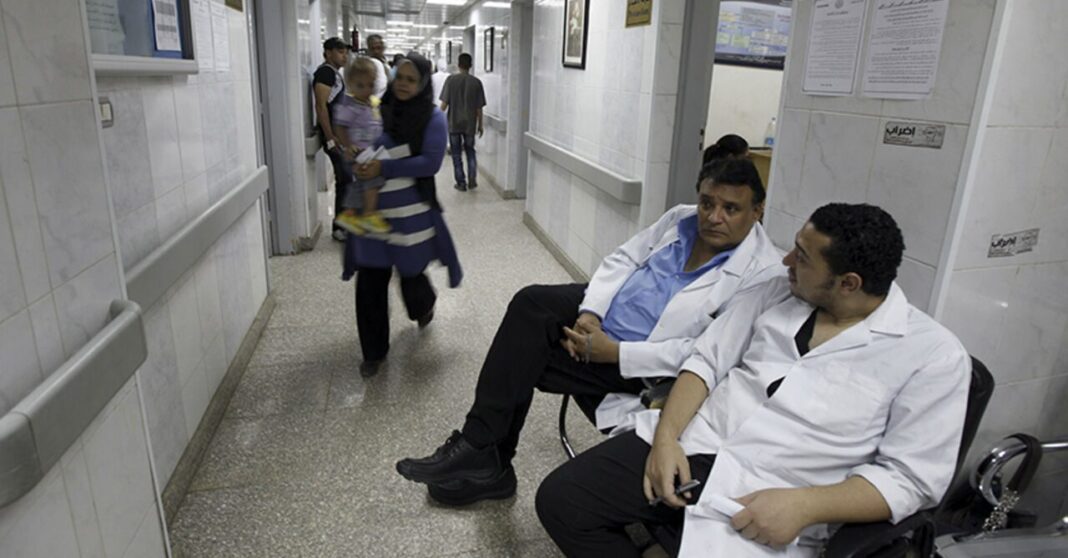In hospitals and clinics across Egypt, a quiet emergency is taking hold as doctors dwindle from the healthcare system. Burdened by overwhelming workloads, stagnating pay, and limited professional prospects, thousands of doctors are departing the country for work abroad.
Their exodus has left a fragile healthcare system straining to meet demand, and millions of Egyptians are increasingly unable to access basic medical care.
Only 38 percent of doctors licensed to practice in Egypt are currently working in the country. The remaining 62 percent are either abroad or on extended leave, according to the Egyptian Medical Syndicate. As a result, Egypt’s doctor-to-population ratio has plummeted from 7.5 doctors per 10,000 people in 2015 to 6.7 in 2020, marking less than half the global average of 17.
According to the Ministry of Health, about 9,000 doctors graduate each year, yet over 60 percent seek work abroad. Lower-income countries like Algeria and Bolivia surpass Egypt’s ratio, with 17 and 10 doctors per 10,000 people, respectively. The United States, by comparison, has 35 per 10,000.
Between 2019 and March 2022, approximately 11,536 doctors resigned from their government positions, according to the Medical Syndicate. Nearly 7,000 Egyptian doctors left the country to work abroad in 2023 alone, the head of the syndicate disclosed.
Ahmed Samir, a cardiologist from Alexandria, 37, left Egypt two years ago after nearly a decade in public hospitals. He told Egyptian Streets, “I wanted to stay in Egypt with my family and serve my country, but every day felt like a battle.”
“Broken equipment, endless paperwork, and a salary that barely covered my rent made the job nearly impossible to endure,” he said.
After receiving an offer from a hospital in Munich in Germany, where his salary would be more than ten times higher, Samir felt he had no choice but to leave. “It was heartbreaking, but I needed to provide for my family and work in a system where I could help people and use my knowledge for good.”
The reasons behind the exodus of Egyptian doctors are both clear and persistent. Doctors working in government jobs earn an average monthly salary of EGP 5,000 (USD 99.22), with some reporting that their paycheck scarcely covers transportation and food. Hospitals often suffer from outdated or broken equipment and overwhelming patient loads, making working conditions harsh.
According to Hisham Ezzat, an Egyptian anesthesiologist practising in Germany, “Many Egyptian hospitals lack the tools and equipment deemed necessary abroad, so doctors are trained to work with whatever they have [in Egypt ] to save their patients.”
Adding salt to the wound, the Egyptian Medical Syndicate cited a hostile work environment, repeated assaults on medical staff, inadequate hospital security, and a lack of both moral and professional recognition as key factors exacerbating the crisis.
Compounding the frustration is the limited opportunity for professional growth. Many doctors report a lack of quality training and few prospects for advancement. Economic instability has only made matters worse, with soaring inflation and a weakening Egyptian pound further eroding the value of already modest salaries.
In April 2025, Egypt’s annual urban consumer price inflation rose to 13.9 percent, up from 13.6 percent the previous month—part of a broader trend since the Russia-Ukraine conflict began in 2022.
The shortage unfolding in clinics and hospitals across Egypt affects millions of Egyptians as well as doctors.
The medical staff, due to being overworked and overstretched, is less able to provide thorough and attentive care to patients who rely on their care. Insufficient personnel further increases the risk of medical errors, misdiagnoses, and overall poorer health outcomes for patients.
Patients are also forced to endure longer waiting times for consultations, surgeries, and emergency care. As a result, many are turning to the private sector, but the high costs associated with private care are out of reach for many low- and middle-income families, further exacerbating the situation.
While some overburdened doctors chose to stay, a 2023 study revealed that 66.4 percent of them intended to leave, with job dissatisfaction as the leading cause. Among those already abroad, only 6.8 percent considered returning.
For Mona El-Sayed, a pediatrician in Cairo, 31, the decision to stay is becoming harder each year.
“I work at two hospitals and a private clinic just to make ends meet. Some weeks, I don’t see my family at all,” she said, noting that the facilities are understaffed and often run out of basic supplies.
Like many of her peers, she has weighed the option of leaving Egypt. Yet, her sense of duty to both her family and the patients she serves has kept her rooted in the country. “Still, I wonder how much longer I can do this.”
As the medical workforce dwindles, Egyptian lawmakers have proposed a bill requiring new doctors to stay in the country for five years after completing their mandatory government service, known as takleef, before seeking employment abroad.
Under Egypt’s current system, medical graduates are appointed to government hospitals after finishing their studies and the compulsory internship year, during which they receive supervised clinical training and are not allowed to practice independently.
The proposed legislation would prohibit doctors from leaving the country during the five years following their takleef. Shakib, the Member of Parliament behind the proposal, argues that since the state subsidizes medical education, graduates should serve the nation before seeking opportunities abroad.
The move has ignited fierce debate among doctors, policymakers, and the public. Proponents argue it is a necessary step to protect public health, while critics say it fails to address the root causes driving doctors away.
Opponents point to systemic problems such as low compensation, poor working conditions, and limited professional development as the main drivers behind the exodus.
Mohamed Sief, 53, an internal medicine physician who has spent 10 years working in Saudi Arabia and five years in Libya, spoke to Egyptian Streets, warning that restrictive policies could backfire, further demoralizing doctors and prompting them to seek alternative careers or emigrate before completing their training.
“Healthcare in Egypt is already a struggle for both doctors and patients,” Sief said. “To address the shortage, we need effective solutions and resources, not additional restrictions.”
Gynecologist Manival Usama opposed the proposal, stressing the need for “working conditions that allow doctors to work peacefully and respectfully, without stress, along with updated medical facilities and higher income” to address the shortage issue.
As for the Egyptian Medical Syndicate, it described the proposal as punitive and foolish, emphasizing that it fails to address the root causes driving doctors to leave.
According to Ehab Younis, professor and head of the economics department at El Shorouk Academy, doctors and experts advocate for comprehensive reforms that include better pay, improved working conditions, investment in healthcare infrastructure, and opportunities for professional development. He advocated for policies that acknowledge the contributions of doctors while ensuring their well-being and dignity.
“We need bold action to retain our doctors here,” El-Sayed said. “Otherwise, who will care for Egypt’s future?”


